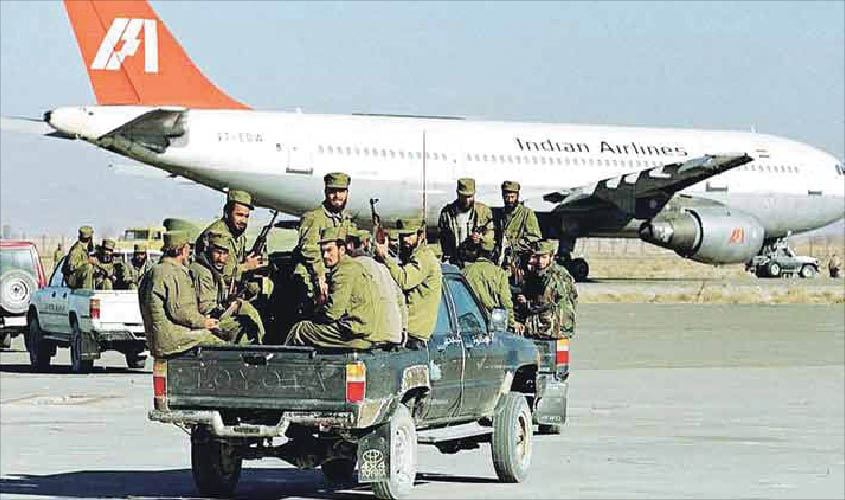Pakistan allowed Masood Azhar to thrive on its land and helped him carry out many deadly terror attacks in India.
New Delhi: The complicity of Pakistan in the hijack of IC-814 aircraft was visible from the very beginning of the incident. India was forced to release dreaded terrorists like Masood Azhar at Kandahar airport in Afghanistan on 31 December 1999. Pakistan later provided safe haven and strategic help to Azhar, who founded Jaish-e-Mohammed and carried out many deadly terror attacks in India.
Speaking to The Sunday Guardian, C.D. Sahay, who had gone to Kandahar to negotiate the release of the passengers of IC-814 as part of the Research and Analysis Wing (RAW) team, recalled the sequence of events that happened on that fateful day, finally leading to the release of three terrorists.
“We were given a list of 36 terrorists with a condition that either we release any seven of them as per our wish or release three as per their wish. We went with the second option. A very important thing is that both the list had the name of Masood Azhar. Actually, the whole exercise was carried out only to free Azhar. Previously too, multiple attempts were made to get Azhar freed,” pointed out Sahay, who later served as the RAW chief from April 2003 to January 2005.
Along with Azhar, a Pakistani, the other two terrorists who were released as per the demand of the hijackers included Mushtaq Ahmed Zargar, a Kashmiri, and Ahmed Omar Saeed Sheikh, a British national. Sheikh was later arrested for beheading American journalist Daniel Pearl and chopping his body into several pieces. While Sheikh is presently held in a prison in Pakistan, Zargar too was last seen in Pakistan where he was living under the patronage of the ISI.
Apart from Sahay, a 1967-batch IPS officer of Karnataka cadre, the other top members of the negotiating team that went to Kandahar included Vivek Katju, then Joint Secretary in the Ministry of External Affairs, and Ajit Doval, who was then with the Intelligence Bureau and is presently the National Security Advisor (NSA).
According to Sahay, the Taliban leadership, to a very large extent, was just acting as a messenger of Pakistan’s military spy agency, the ISI, whose officials were sitting at the Air Traffic Control (ATC) tower in Kandahar and relaying message to the Indian team through the Taliban negotiators.
“We had our information, our assets who showed us and identified each and every ISI official who was present at the spot and were giving instruction to Taliban and to the hijcakers. Many times our offer would be accepted on the ground, only to be later overruled or modified by the ISI officials at the ATC.
“When Azhar, along with the other two terrorists got down at the tarmac, he was greeted by Taliban and other officials in a manner as if two long lost brothers were uniting after a long time,” he recalled. The other two terrorists, however, received no such warm welcome.
According to Sahay, the hijackers were adamant on the release of Azhar and the government had no choice but to release him. Even the Taliban was repeatedly telling the Indian team to end this entire thing as quickly as possible.
“No other option was there but to release him. Every such decision, in any government, is taken after a lot of deliberations from every relevant stake-holder. Every pro and con is weighed and then only a decision is arrived at,” he added.
Sahay stated that overt action to take the control of the aircraft was not feasible as the aircraft was in a place which was not cooperative. “We had limited options. It was a hostile territory,” he explained.
India had limited options to choose from at that time also because the world’s view regarding terrorism was not that strong as it is now. Terrorism was not a major global issue before ghastly terror attacks like 9/11 happened and brought the dangers of terrorism to the fore.
The cooperation that existed between India and other countries was still at its nascent stage. This was evident from the fact that the UAE government, which had initially refused to allow the aircraft to land in Dubai, acceded to India’s request only after the US intervened on India’s behalf.
The hijackers, apart from the release of the terrorists, had made other demands like returning the remains of Sajjad Afghani, a terrorist who was incarcerated along with Azhar but was shot dead in June 1999 while trying to flee Kot Bhalwal prison, Jammu, and an unidentified amount of ransom money, both of which did not go through.

